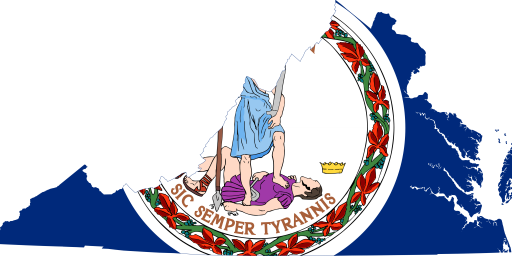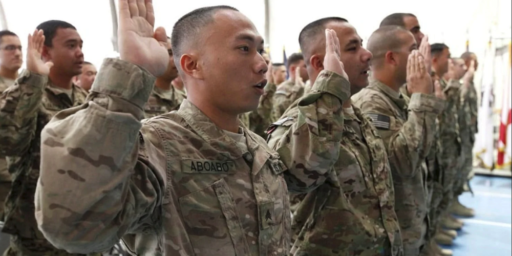Rich AWOL from Military
Kathy Roth-Douquet, who has never personally served in the military but is married to a Marine officer, laments the fact that the children of the wealthy tend not to serve in the armed forces.
Thanks to Sen. John McCain’s youngest son checking into Marine Corps boot camp, the number of Congress members with enlisted children will skyrocket a whopping 50 percent. He joins the armed forces with two other enlisted and a few officer children of those serving in Congress in this nation at war, meaning that in all, about 1 percent of U.S. representatives and senators have a child in uniform. And the Capitol building is no different from other places where the leadership class of this country gather — no different from the boardrooms, newsrooms, ivory towers and penthouses of our nation. Less than 1 percent of today’s graduates from Ivy League schools go on to serve in the military.
Indeed, one of McCain’s other sons is currently a midshipman at the Naval Academy, joining his father, grandfather, and great-grandfather in that tradition. Still, the idea that only enlisted service in the military really counts is rather odd. Further, as I’ve written before, the percentage of Members with children who have served in Iraq is actually higher than the national average and, given that most Members are older, one suspects the number who have grandchildren in the military is also relatively high. Indeed, I don’t have data for comparison purposes, but if even close to 1 percent of Ivy League grads go on to serve in the military, that strikes me as rather high for what is after all a smallish volunteer force.
Why does it matter? Because, quite simply, we cannot remain both the world’s great power and a robust democracy without a broad sense of ownership — of all classes but particularly the leadership classes — in the military. Our military is too consequential, and the implications of our disconnect from it too far-reaching. We are on the wrong path today.
While I don’t disagree that the military is “consequential,” it’s far from clear that we are in danger of losing our democracy, let alone our status as a world power. Indeed, our military is inarguably more robust now than during WWII, during the height of the all-class force.
Those who opine, argue, publish, fund and decide courses of action for our country rarely see members of their families doing the deeds these leaders would send them to do, deeds which have such moment in the world. These deeds hardly begin and end with the Iraq War — 200,000 U.S. troops are deployed in 130 other countries around the world, keeping it “flat,” in Thomas Friedman’s phrase. They train other nation’s security forces, help keep the peace, provide humanitarian assistance, rescuing Americans from Lebanon, standing ready to go to Darfur if sent, to go wherever the country calls on them for assistance — in short they do the complex work of the world’s sole superpower. Yet these doers are strangers to most of us, and the very missions they do are mysterious.
The intellectual class has very little grounding in almost anything you’d want to name–economics, business, technology, agriculture, manufacturing, medical science, the law, and so forth. That’s the nature of specialization.
When the deciders are disconnected from the doers, self-government can’t work as it should. Most of these decisions about whether and how to use the U.S. military are hard, and we need to be as best equipped to make them as possible. We need to be intellectually capable — have real knowledge about what the military in fact does, but we also need to be morally capable, which means we need a moral connection to those Americans we send into harm’s way. Moreover, we need the largest pool of talent from which to draw those troops. Military work must not simply become fee for service.
Frankly, I’m not sure three years’ service as a junior enlisted soldier really does much to help one appreciate the fundamentals of grand strategy.
A Duke University study demonstrates that it matters whether civilian decision makers have military experience: A review of U.S. foreign policy over nearly two centuries shows that when we have the fewest number of veterans in leadership and staff positions in Congress and the Executive branch, we are most likely to engage in aggressive (as opposed to defensive) warfighting. And we are most likely to pull out of conflicts early.
A study by the eminent military sociologist Charles Moskos shows that the population of a democracy is not willing to sustain military engagements over time if the leadership class does not also serve in the armed forces. Its lack of service sends a signal that the conflict is not vital, or worthwhile. Since we don’t know what conflicts will come — or which party will be in power when they do — these findings should matter to all of us.
I’d have to read the studies in depth to understand the methodologies. My strong suspicion, however, is that the results are an artifact of the types of wars we’re fighting rather than who’s in charge. The list of wars that the United States have fought that took any substantial length of time for which we sustained broad support: World War II. End of list.
Almost all other wars we have fought have been either short or messy and controversial. The leadership during Vietnam consisted almost entirely of WWII and Korea vets and yet support nonetheless collapsed. Post-Vietnam wars have been fought in the shadow of Vietnam and, unless short and painless (e.g., Desert Storm, Grenada) been quite controversial.
Only in the last twenty years or so have most of our civilian leaders been non-veterans. But being a veteran doesn’t innoculate a leader from lack of public confidence.






Is strategy what’s important, or the price of action or inaction? I would think there are plenty of experienced advisors on the subject of strategy.
I am not sure why she enlisted service is more important or different with regard to the rich. Seems to me if you are signing up either as part of the officer corps or you are enlisting-you are still serving, and I have noticed quite a few officers on the lists of dead and wounded.
I’d have to read the studies in depth to understand the methodologies. My strong suspicion, however, is that the results are an artifact of the types of wars we’re fighting rather than who’s in charge. The list of wars that the United States have fought that took any substantial length of time for which we sustained broad support: World War II. End of list.
I agree-and WWII isn’t really camparable to any military action since in regards to the goals and effort by the military and those at home.
This Roth-Douqet lady is clueless. Why in the world would wealthy kids–or those with good social prospects–volunteer to join the military when the costs clearly outweigh the benefits.
If you are, say, a Harvard grad, three years, or so, of service is going to sidetrack your career and earning potential. While you are over in Iraq, your classmates will be climbing the corporate ladder. You lose the experience and resme development.
Furthermore, the costs of possibly fighting in a war WHERE YOU CAN DIE in a god-forsaken part of the world in relative discomfort are much higher than living the good, high-consumptive life, safely ensconced in a major capitalist city like New York, Boston, or San Fran.
Most rational people would avoid the military option like the plague.
Luckily the military is basically the only well-funded government program that allows a modicum of social advancement. However, its attractiveness is only evident for the poor–the wealthy have other options. Thus, people without any other options can go into the military and go over and fight in Iraq, while those people with more options can exercise them without any trouble.
Duty and Honor, perhaps!?
The military is better off without the spoiled, nancy-boys that attend “elite” schools. Honor and Duty is a foreign concept to them.
Give me a break! Are you saying that people who don’t join a VOLUNTEER army are lacking in “honor”?
If that’s the case, are people who took student deferments during the time when there was a draft lacking in “honor”?
Ditto what Fersboo said.
Further, it’s time the American people came to terms with the posiblity of dying in a less-foprsaken part of the world (ours). Perhaps going to those god-forsaken places only helps ensure the safety of those at home.
Sammy – great troll. I’m waiting for the answer to that question.
“Give me a break! Are you saying that people who don’t join a VOLUNTEER army are lacking in “honorâ€?
Honor for your information is a personal perception of one’s self.
“If that’s the case, are people who took student deferments during the time when there was a draft lacking in “honorâ€?
Perhaps, but it is more than likely to be a lack of Duty.
Real question is why arent the leaders who vote for war forced to send their kids to the front line.
They are forcing those who enlisted to go…so why dont their kids go?
If they really support their values they should have no problem sending their childern first!
Jeffry, that is an extremely ignorant statement, which adds nothing to the discussion. Kinda like saying, no oil for pacifists!
Honor, Duty, Patriotism, all good qualities that serve our country well. Those who do not serve in preference to making it big in the corporate world don’t know the meaning of the traits listed above. Greed is the motive for those who don’t think it is honorable to serve in the military. They would rather hide behind their Mommy’s skirts rather than protect the country and preserve our freedoms. Self centered, selfish, and just plain chicken, are also names for those who would rather be more self serving than make any sacrifice for anyone but themselves.
Is it any wonder that the Colleges and Universities of today do not teach Duty and Honor as a subject. Most of them have no sense of duty and teach only the liberal agenda that in itself is self serving and very un patriotic.
Oh, come on! Are you saying that Dick Cheney was hiding behind Lynne’s skirts when he got his deferment to get out of the draft?
Are you saying that his daughter and war-supporter, Mary, is “self-centered, selfish, and just plain chicken”? How about Scalia, Perle, Hastert, McConnell, Robertson, etc…?
How dare you impugn these true patriots!
It’s a volunteer army. If the poor volunteer more than the rich, is that necessarily a problem?
You can spin this another way, is the military disproportionately helping the poor? It’s just as stupid a question, it’s a volunteer army!
Again, the feeling that people who advocate war should share the risk is stupid. It’s the same as suggesting that only the family of servicemen should be allowed to hold seats in Congress, obviously a stupid suggestion.
People take a career path they feel is their best option. For some it’s corporate positions, for others its the military. Some go against their best interests in the spirit of honor or duty, but you can’t expect everyone to do that.
I would be curious to know exactly what Herb has sacrificed for the rest of us in his spirit of Duty and Honor.
Sammy,
Can you understand the idea that some people might be motivated by something you don’t value. Mother Theresa lived a very material possession impoverished life helping the poor because her motivation was not driven by material provisions.
My family (parents, siblings and their/my children) has 2 people actively serving out of 30 people (about 6% of us are currently serving, I am not), higher than the the less than 1% participation national average. In fact our families current participation rate is higher than any rate in US history except for WWII.
My church is running at about 5% serving in the military compared to the average weekly church attendance.
If 1% of ivy schools are serving, then they are running ahead of national average.
If you look at the states, only five of the nineteen states which went for Kerry have participation rates greater than 1% CA, HI, W, IL, MD). In contrast, 17 of the 31 states that went for Bush have participation rates above 1%. Five of the states have participation rates greater than 5% (TX, FL, GA, NC, VA).
So while I can understand about not wanting to serve in the military. Not everyone feels the call of duty nor do all of those who feel the call qualify. Others feel they can honor those who do heed the call to duty and serve their country in other ways.
As was pointed out, honor is a personal term. How you judge a person’s honor is dependant on your own judgement, whether that person is yourself or someone else. A Mafioso may consider himself an honorable man, but don’t expect those outside of the mafia to see him as such.
There are those who make a different calculation as to the costs and benefits of service than you. Imagine the US with no military. Other countries do it, e.g. Costa Rica. Do you really think the US would be anywhere close to its current economic situation without a military? Do you think that we would be free from foreign domination?
Would we lose the benefits we enjoy like free speech immediately on the military ceasing to exist? No. But I can guarantee you that eventually we would lose out. You could argue that are sheer size and a militia could keep us free. But think of the costs to fight that battle for freedom in our own homes and against a military properly led, with good training, communications, equipment and logistics.
So those who choose (and are able) to serve our country and keep it free deserve your respect.
Obviously Sammy has a personal problem. Perhaps a tour of duty in the military would teach him some self discipline and respect for others who join the military to protect the freedoms he enjoys so much. However I guess there will always be those who do not understand that they, as citizens of this great country, have the duty and obligation to “preserve, protect and defend” our country and its citizens.
Let me tell you something Sammy that you have yet to comprehend.
You, like everyone on this good earth are going to die. It may be sooner or later, but you will surely die. Now, the question is, are you going to have a clear conscience when you go or, will you have to hang you soul in shame for not preforming you duty to others.
It is also obvious that he failed completely to comprehend what I was saying in my previous comment. That is, we have a goodly number of citizens here in the US who put themselves above and ahead of others who fight his battles that he runs from with his tail between his legs.
The point is that most colleges and universities do not teach the value of freedom and the obligations citizens have in protecting those freedoms. Instead, they teach students how to put the screws to others so they can be a success and let others fight for their sorry rear ends.
Micheal, I can’t answer for Herb, but I served my country for 8 years by putting on an Army/National Guard uniform. When I entered college, my classmates were, with few execptions, 10 years my junior. Meanwhile, most of my friends from back home purchased homes and started families. I did feel some envy when I returned home, but I know I fulfilled my DUTY to my country and I did it with HONOR. Rest easy, you can go make your riches, there are honorable men and women keeping you safe.
In three years service in the Army at least, especially now, it’s very possible that a person would achieve the rank of a Non-Commissioned Officer, a Sergeant E-5. As such, that person would learn to be responsible for him or herself, as well as leadership and training of several other junior Soldiers, often in high pressure situations where good decisions must be made quickly with the information at hand. Just how much is that worth?
On a larger scale, in three years an enlistee could learn the values of teamwork, loyalty, duty. In three years, a person could see countries that he otherwise would not have seen, and maybe that bradened perspective will be beneficial in dealing withthe worlfd atlarge when that person is in a more responsible position in later years. While I have no statistics, several of the Soldiers I know entered the service after partying out of college, or from just wanting to do something more than sit in a classroom. Someone mentioned starting a career late if serving for threee years, but isn’t it possible that the skills and experience acquired in those three years of service mighht enable a veteran to perform at a level that he or she could start at higher than entry level, or advance at an equal or faster pace? In my book, it’s not the starting line that is important, it’s the finish, and life is a marathon, not a sprint.
In three years I learned that guys who spelled poorly but new how to fix a generator were much more useful than Harvard grads when the power goes out, a Southern accent did not necessarily mean illiterate, stuipid, or bigoted. I learned that learning a foreign language was a great way to open relationships between people from different nations. I learned that there is a great deal of difference between a Communist Utopia and the reality of East Berlin. I learned that hardships could be endured, especially if you have some good friends with you. I learned that some folks will break under pressure, and not everyone has my best intentions at heart. I learned that America is not loved by everyone, and it surely is not perfect, but it is loved enough that a citizen behind the Iron Curtain would whisper, or one along a dusty roadside in Kuwait would shout, “”God Bless America” at the sight of an American servicemember.
3 of the best and most life shaping years I ever spent were my first three years of enlistment. Nowhere else that I know of allows, more accurately forces, a young adult straight out of high school or college to take on the responsibilites of adulthood and citizenship.
That being said, Soldiers are hardly plaster saints. I also think that only those who wish to serve do so. I am just saddened that the idea of selfless service, military or otherwise, is often addressed with rolling-eyed disdain, if it is addressed at all.
SFC SKI: I agree that military service is valuable in many, many ways. While I oppose a return to the draft, there’s little doubt that many if not most of those forced to undergo a couple years of military training and experience came away more confident, well rounded individuals as a result.
Still, that’s all very tangential to Roth-Douquet’s point. Indeed, she herself seems to have managed to acquire a perspective on world affairs and the ability to comment intelligently on matters of war and peace without having served.